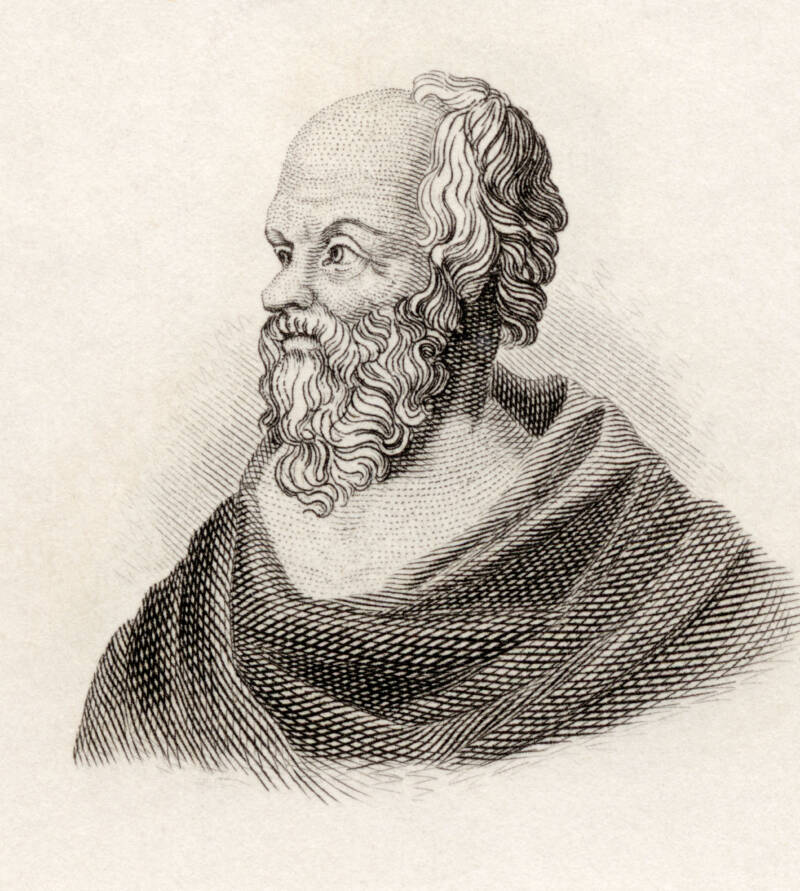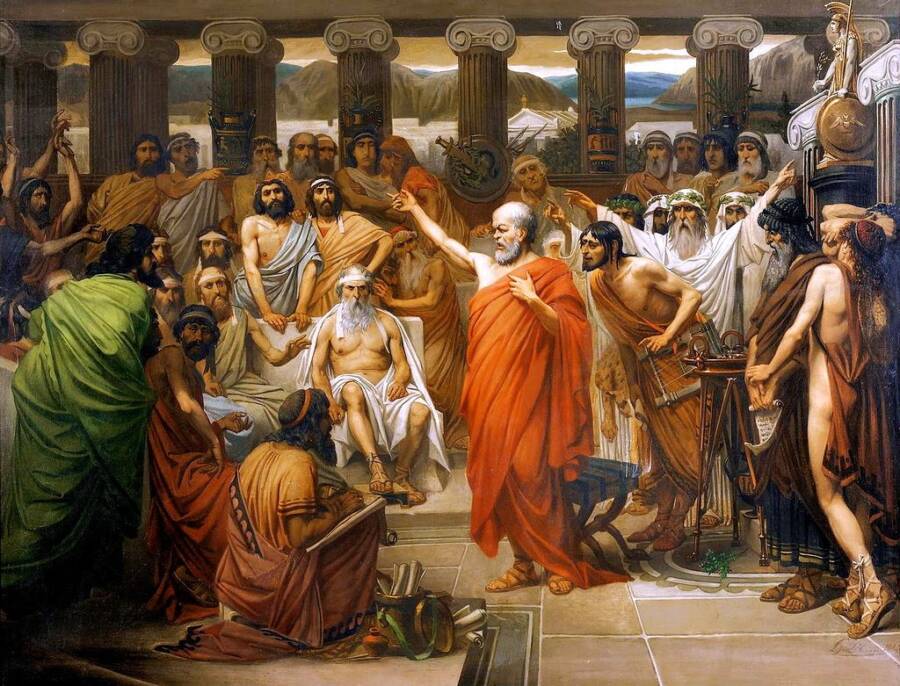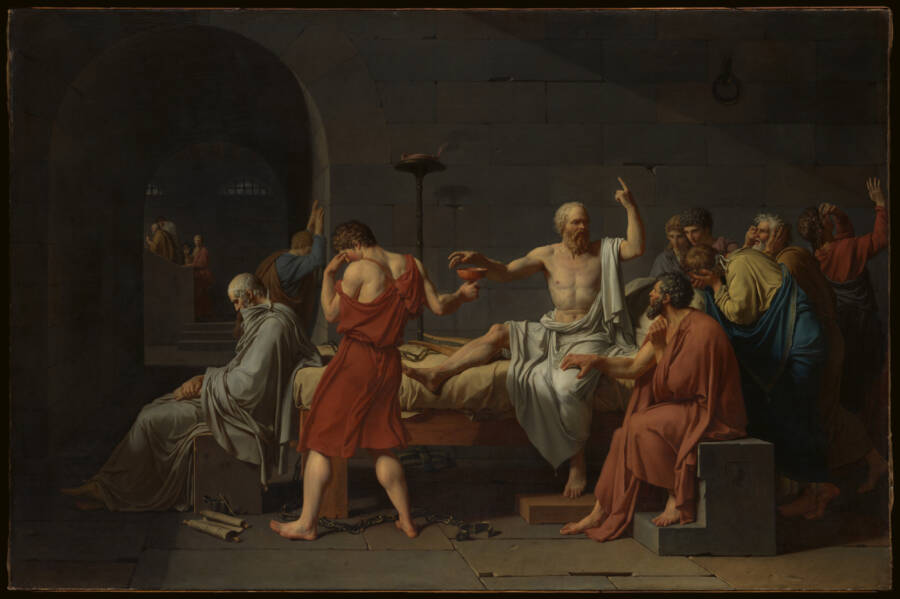Despite his spirited defense against charges of impiety and corrupting the youth, Socrates was sentenced to death by poisoning in 399 B.C.E. by a jury of his Athenian peers.
Socrates was one of ancient Greece’s most influential philosophers. With his interrogative nature, he stands alongside Plato, Aristotle, and Epicurus as one of the great minds of the ancient world.
But in his time, Socrates was also a controversial figure. Though he had many followers — despite never putting his thoughts down in written form — comic dramatists parodied and mocked Socrates’ teachings. What’s more, the philosopher cut an unusual figure in beauty-obsessed Athens with his potbelly, unkempt hair, and bulging eyes.
Then there is the matter of Socrates’ death. At the age of 70, Socrates was brought to trial and charged with impiety, or a lack of reverence for the Greek gods, as well as corrupting the Athenian youth. He was ultimately sentenced to death by a jury of his fellow Athenians.
In the wake of his death, Plato wrote the Apology of Socrates, which was purported to be the speech Socrates gave at his trial (in Greek apologia means “defense”). This speech became a foundational document and cemented Socrates as one of history’s greatest philosophers.
So how did Socrates die? And why?
Who Was Socrates?
Born in in 470 B.C.E. in Athens, Greece, Socrates was one of the three most influential thinkers of Classical antiquity, alongside Plato — an avid student of Socrates — and Aristotle. Though he and his ideas were mocked during his life, particularly in Aristophanes’ popular play Clouds, Socrates’ philosophies have endured for thousands of years.

Classic Image / Alamy Stock PhotoSocrates, a Classical Greek philosopher who lived from 470 – 399 B.C.E.
Despite being revered as a great thinker, Socrates famously claimed that he never sought to teach anything — because he knew nothing. Rather, he was known for what has since been dubbed the “Socratic method” of engaging in public, question-driven conversations about a litany of subjects like the nature of justice, virtue, and wisdom.
In short, his philosophy be summed up in a single quote:
“The only true wisdom is in knowing you know nothing.”
But Socrates was not without his detractors. In beauty- and status-obsessed Athens, Socrates stood out because of his physical ugliness and disinterest in amassing power. He also pushed back against many cherished Athenian ideas, like Greek democracy, and, worst of all, often made his fellow citizens look like arrogant fools.
But more serious charges were also levied against the philosopher at the end of his life, which would lead to Socrates’ death.
The Controversies And Crimes Of Socrates
Beyond embarrassing his fellow Athenians in debate, the philosopher also made a number of decisions which may have ultimately led to Socrates’ death in 399 B.C.E.
While serving in Athens’ assembly, or ekklesia, in 406 B.C.E. after the Peloponnesian War, Socrates alone opposed putting Athenian generals who had failed to recover their dead from the battlefield on trial. In 409 B.C.E., Socrates similarly stood alone when he refused to participate in the arrest and execution of a man named Leon of Salamis.
Furthermore, Athens had changed. And as the city’s strength faltered, it became less tolerant of the strange philosopher with his unkempt appearance and constant barrage of questions. Socrates’ ideas about individualism suddenly took on a sinister note for many Athenians.

Public DomainSocrates addressing a crowd of Athenians.
Indeed, some historians have suggested that much of the public disdain for Socrates stemmed from a resistance to self-reflection. When times were good, it was perhaps easier to entertain deep questions. In more volatile times, however, questions could be dangerous.
Plato’s Apology, which begins with a purported recounting of Socrates’ speech to the jurors at his trial, explains this notion further. Generally speaking, however, Socrates got in trouble for his tendency to cross-examine the firmly held beliefs of his fellow citizens.
He happened to speak most frequently with Athen’s youth, who often took his ideas and used them against the older generations. Thus, Socrates was eventually charged with “corrupting the youth.”
This charge, and the charge of impiety, led to Socrates’ death.
How Did Socrates Die? Inside His Forced Suicide

Public DomainThe Death of Socrates by Jacques Louis David (1787).
Ultimately, Socrates was brought to trial on charges of impiety and corrupting the youth.
And though Socrates mounted a spirited defense, as documented by Plato, he was unable to convince the 500-man jury of his innocence. They voted to convict him on a vote of 280 to 221.
The ancient Athenian system also allowed defendants to suggest their own punishments. Socrates, jokingly, first said that he should be rewarded. His jurors did not find this funny. He then suggested an incredibly small fine.
This did nothing to sway the jury — quite the opposite. More jurors voted for the death penalty than had deemed him guilty.
Even then, the philosopher was given the option of exile from the city. But he chose to remain and accept the verdict. He said that “he owed it to the city under whose laws he had been raised to honor those laws to the letter.”
Ultimately, Socrates was given a cup of poison — likely hemlock, a highly poisonous plant related to parsley — and ended his life at the age of 70, hated by many of his fellow citizens. But that didn’t seem to bother the famous philosopher, who purportedly met his end bravely.
As his student Plato wrote: “He appeared happy both in manner and words as he died nobly and without fear.”
The Controversial Charges That Led To Socrates Death
Ever since Socrates died in 399 B.C.E, the charges against him have been scrutinized by scholars. Did the philosopher deserve his sentence?
As art historian David Bowles argued: “the charge of impiety is a vague accusation which would have been unlikely to produce a conviction on its own. Similarly, the second charge of corrupting the youth is ambiguous and lacks any substantial evidence in support of it.”
Socrates’ indictment explained that the impiety charge came about because he was “guilty of not recognizing the gods recognized by the city, and of introducing other new divinities.” However, Bowles noted that many foreigners, non-citizens, and slaves all practiced various religions. Even the pantheon worshipped by the ancient Greeks had its own array of different deities.
That said, Socrates was known to refer to “God” instead of “gods.”
And as for the charge of “corrupting the youth,” Socrates himself had addressed that, admitting that his conversations with younger citizens may have inadvertently created some generational discourse, but it was hardly on the scale of anything revolutionary.

Public DomainSocrates teaching Alcibiades.
But a a controversial 2009 study from Cambridge University classicist Paul Cartledge argued the opposite: that Socrates had indeed been “guilty as charged.”
“Everyone knows that the Greeks invented democracy, but it was not democracy as we know it, and we have misread history as a result,” Cartledge said. “The charges Socrates faced seem ridiculous to us, but in Ancient Athens they were genuinely felt to serve the communal good.”
This was especially true in the atmosphere of the day, as Athens was going through hard times. Undesirables like Socrates who pushed back against the status quo were easy scapegoats. In the philosopher’s case, his interrogative nature and refusal to adhere to social norms led to his death.
After reading about the death of Socrates, learn all about the death of Roman emperor Julius Caesar. Then, dive into the disturbing theories surrounding the death of Alexander the Great.






